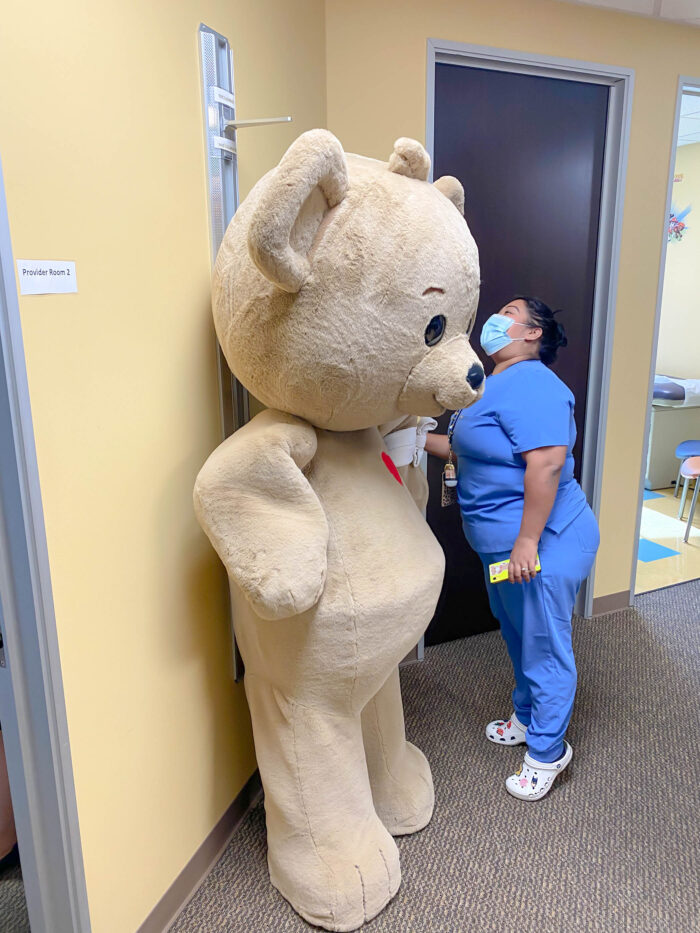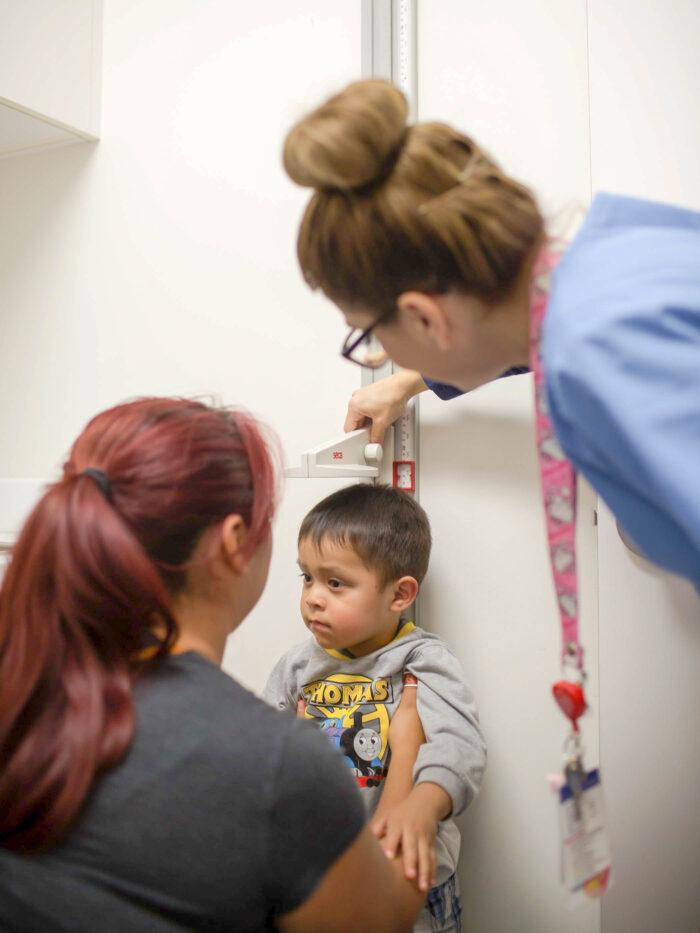GUIDE
How to choose a pediatrician
Choosing a pediatrician is one of the most important decisions you can make for your child’s health and well-being. Your child’s pediatrician will be your partner in parenthood until your child grows up, so finding someone you trust is essential. This guide will walk you through choosing a pediatrician that fits your family’s needs and values so you feel confident your child is getting the best possible care.

Does my child need a pediatrician?
Every child should have a dedicated pediatrician to manage all of their medical needs. Children require specialized medical care tailored to their physical, emotional and developmental needs. Pediatricians are experts in recognizing, diagnosing and treating the specific health concerns of children, including issues related to growth and development, behavioral problems and childhood illnesses. They also know about childhood vaccinations and can guide nutrition, safety and injury prevention. By choosing a pediatrician, you can be confident your child receives expert care designed for their age and individual needs.
A pediatrician’s office is generally also designed with kids in mind. Waiting areas and exam rooms are inviting spaces with books or toys to help make children feel comfortable and engaged. In addition, pediatricians’ office schedules are usually more flexible to accommodate same-day appointments, which are especially helpful if your child gets sick and needs an appointment quickly.
When should I look for a pediatrician?
Several milestones in a child’s life can signal the need to look for a pediatrician. Whether you’re a new parent, moving to a new place or just looking for a new doctor, these are all excellent times to start searching for a pediatrician.
Having a new baby
Choosing a pediatrician before your baby is born can make you feel more confident about your baby’s care, which can ease some of the stress that comes with being a first-time parent. Expectant parents should begin their search for a pediatrician 3 to 4 months before their due date. These months give you enough time to ask for recommendations, check with your insurance provider and look at online reviews.
Moving to a new place
A pediatrician can provide valuable guidance and support as you navigate the unique health and wellness challenges of living in a new environment. If you are planning to move to a new area, it is essential to find a pediatrician sooner rather than later to ensure your child’s health needs are met before, during and after the move.
Insurance open enrollment
An open enrollment period occurs once a year, allowing you to consider new healthcare options for your child. If you are unhappy with your current physician or are considering switching insurance plans, open enrollment is the perfect time to consider your options. The open enrollment period can vary by state, employer and provider. Your insurance provider or employer’s human resources representative should be able to provide you with specific open enrollment details.
If things aren’t working with your current pediatrician, you don’t need to wait for one of these milestones to begin looking for a new provider. Any time is the right time to make a change if you feel it’s necessary for the health and well-being of your child, so don’t hesitate to seek out new options for care whenever you choose.
Find a CHOC Primary Care Pediatrician
From babies to teens, pediatricians from CHOC’s Primary Care Network partner with parents to offer immunizations, sick visits, sports physicals and more.

How do I find a pediatrician?
When finding a pediatrician for your child, there are many different options. You can ask your friends and family for recommendations or conduct research online. Using a combination of these strategies can help make sure you find a physician who meets your expectations. If you’re ready to begin looking, here are a few ways to narrow down your search:
- Ask friends or relatives. Start by asking people around you whose opinions you can trust. Your friends and family likely have similar values and preferences; their input can be valuable here.
- Talk with coworkers and neighbors. Your coworkers and neighbors may be in similar stages of life to you, whether they have kids around the same age as yours or similar jobs or lifestyles. Regardless, these people may have great recommendations that are close by.
- Ask your OB or hospital staff. If you’re pregnant and still seeing your obstetrician, ask if they have any pediatrician recommendations. They may be able to refer you to a pediatrician they trust and have worked with in the past. Nurses and staff at your delivery hospital may also have recommendations for you.
- Insurance website. Your insurance carrier’s website can be a great starting point if you have insurance coverage. Here, you can determine which pediatricians participate in your plan to maximize your benefits and minimize out-of-pocket fees.

What to consider when looking for a pediatrician
Everyone has their own unique set of criteria for choosing their pediatrician. Some may prioritize finding a conveniently located doctor, while others may place more importance on experience level. As you navigate selecting a physician, it’s essential to consider your priorities and preferences.
Criteria to consider
To help you get started, here are a few factors to consider:
Office operations
- Location
- Hours of operation
- After-hours care
- Methods of communication
- Appointment scheduling
- Telehealth availability
- Sick and well waiting rooms
Payments
- Insurance accepted
- Cost of services
- Hospital affiliation
- Payment options
Pediatrician traits
- Gender
- Language
- Experience
- Credentials
- Personality
- Values
We understand that assessing all these factors can feel overwhelming, but a simple way to make the process easier is to create a checklist. To begin, divide your checklist into three categories: “must-have,” “nice-to-have” and “not necessary.” Once you’ve outlined the most important criteria, you’ll be able to target your search and make an informed decision.
Understanding the primary care vocabulary
As you begin your search, you may notice a few unfamiliar terms or clinical jargon that can be confusing. To help you make sense of it all, we’ve compiled a few key differences to be mindful of:
Pediatrician vs. Family Physician
Although the length of training is the same for both, family practitioners treat patients of all ages, while pediatricians specialize in caring for children from infancy to adolescence. Most pediatricians will care for children through age 21, but age ranges may vary by practice.
Board Certification
After a pediatrician graduates from medical school, they complete a three-year residency program in pediatrics. At the end of their residency, a pediatrician can pass a series of exams administered by the American Board of Pediatrics to become board-certified in their field.

Evaluating potential pediatricians
Whether you try out just one or several, consider your experience and evaluate if that office or pediatrician is right for you and your child. As you’re reflecting on the considerations from above, it can help to create pros and cons lists to get your thoughts out on paper. You can even reference your “must-have,” “nice-to-have” and “not necessary” lists from earlier. Did they have everything on your “must-have” list? If they didn’t, did they make up for it elsewhere?
Online research and questions to ask during a phone screen
The next step is to conduct online research to narrow your list of potential pediatricians, followed by a phone screen. This phone call is your chance to ask the office staff about anything you couldn’t find on their website. You can also ask general questions about the physician’s background to inform your first in-person meeting. It is unlikely that you will speak to a pediatrician during this call, so you can save any specific questions you’d like them to answer for your first in-person meeting. Below are a few questions you can look for online or ask during a phone screen:
- Pediatrician’s background. Where did they go to medical school? Is this pediatrician aligned with good subspecialists and their local children’s hospital?
- Resources for support. Do they have available online resources for parents, such as a blog or email newsletters?
- Insurance. Is this pediatrician in-network with your family’s insurance plan? Are they accepting new patients? Is there a co-pay? When are payments due?
- Hours of operation. What are the office hours? Do they align with your family’s schedule? What type of after-hours care do they offer? Are they open on holidays?
- Appointment scheduling process. How far in advance do appointments need to be scheduled? What is their cancellation policy? What if you need to schedule an urgent or last-minute appointment? What is their proposed well-check schedule?
- Communication methods. When is the best time to call with routine questions? Does the office use paper or electronic records? Do they have an online patient portal?
If you’re satisfied with how the conversation went, you can ask to set up an initial meeting with the physician. You can opt for meeting over the phone, but going into the office allows you to observe the doctor’s persona and bedside manner. Some offices will also provide meet-and-greet tours so that you can get a feel for the atmosphere.
What is an introductory office tour?
Before your child’s first official visit, you can set up an initial office visit. This meeting is an opportunity to get to know the pediatrician and ask questions to help you decide if they are a good fit. Remember, you’ll spend a lot of time with a pediatrician as your child grows up, so you’ll want to find a doctor who makes you feel comfortable and confident. Here are a few things to consider, to help you prepare for your first meeting with a pediatrician.
Don’t be afraid to ask questions. Outline your priorities to inform the questions you want to ask. For example: What are the issues the pediatrician stands for and do they align with yours? What is their proposed well-check schedule?
Observe the atmosphere. When you arrive, try to take note of your surroundings. Ask yourself: Are you being rushed? Was the wait long? Is the environment kid-friendly? Is the office clean?
Analyze your interaction. Did they make you feel comfortable and heard? Was their information clear? Did their personality match your expectations? Were the office staff friendly?
Check for CHOC
During open enrollment, make sure your health care plan includes CHOC.

Congratulations, you chose a pediatrician! Now what?
Getting your kids out the door on time is stressful, especially when you’re headed to the pediatrician’s office. When it comes to your first pediatrician visit with your child, a little planning can go a long way.
How to prepare for your first pediatrician visit
To help you prepare, we’ve compiled a list of things to bring to the pediatrician’s office.
- Insurance card and identification
- List of medications your child takes
- Paperwork from any other recent doctor’s visits, such as urgent care or the emergency department
- School paperwork if your appointment is for a physical tied to school activities
- Baby supplies: diapers, bottles with food, a blanket and pacifier
- A favorite stuffed animal to be “examined” by the doctor if your child is nervous
- A favorite book, game or tablet to keep them occupied during any wait
- List of questions you and your family may have
- Parents are encouraged to try and make childcare arrangements for siblings, especially during flu season.
- Parents should not give their children a snack or drink while waiting to be seen to avoid delaying potential testing.
When should my child see the pediatrician?
It can be difficult to decide what illnesses you should treat at home, and which require a trip to the pediatrician. We understand that, as parents, you want to do everything you can to keep your child healthy, so we’ve gathered a list of scenarios that require a visit to your pediatrician’s office.
Newborn check-up schedule. Newborns require frequent well-checks to ensure their growth and development are on track. Babies should receive a well-check at the following ages:
- Newborn
- By one month
- 2 – 3 months
- 4 – 5 months
- 6 – 8 months
- 9 – 11 months
- 12 – 14 months
- 15 – 17 months
- 18 – 23 months
Immunizations. They also need timely vaccinations to prevent them – and others – from getting diseases like measles and whooping cough. Staying current on vaccinations is important for everyone, especially babies and children. When babies, children and teens follow the recommended immunization schedule from the American Academy of Pediatrics (AAP) and the U.S. Centers for Disease Control & Prevention (CDC), they are better protected against potentially life-threatening diseases. Learn more about childhood vaccinations in our Immunization Guide
Ongoing well-checks. Kids are kids. They need well checks to keep them healthy and on track with developmental milestones, and parents deserve the peace of mind of knowing their children have access to safe, high-quality care. Each pediatrician will have a different well-check schedule, so please confirm with your pediatrician about their recommended frequency.
Sick visits. Pediatricians offer same-day sick appointments for issues such as fever, strenuous breathing, vomiting, diarrhea, sore throat, ear pain and many other concerns. Please visit the CHOC Care Guide for more detailed information on where to go for care based on your child’s symptoms.

How to build good communication with your pediatrician
Your relationship with a pediatrician is a two-way street. Open communication with your child’s doctor can make all the difference in the quality of care your child receives. Here are a few tips for establishing a positive and productive partnership with your pediatrician early on.
- Express your concerns before your appointment. When making the appointment via phone or online, mention any concerns you want to cover during the appointment. That way, your child’s doctor can come prepared to discuss your concerns and make an informed recommendation.
- Write down your questions. Bring a list of questions to your child’s appointment so you can ensure all of your concerns are addressed at the visit.
- Schedule a follow-up. Doctors run a tight schedule, and fitting everything in during one appointment slot can often be challenging. If there was not enough time to address all your questions during the appointment, you can schedule a follow-up to make sure all of your questions get answered.
- Ask for more information. There’s no such thing as a dumb question. Doctors understand that you only want the best for your child, and they’re more than happy to clarify any questions that may come up.
Find a CHOC Primary Care Pediatrician
From babies to teens, pediatricians from CHOC’s Primary Care Network partner with parents to offer immunizations, sick visits, sports physicals and more.
More resources for parents
The guidance on this page has been clinically reviewed by CHOC pediatric experts.
For more health and wellness resources from the pediatric experts at CHOC:
Sign up for the Kids Health newsletter.
The contents of this webpage, including text, graphics, audio files, and videos (“Materials”), are for your general information only. The Materials are not intended to substitute qualified professional or medical advice, diagnoses, or treatments. CHOC does not recommend or endorse any specific tests, physicians, products, procedures, or other information that may be mentioned on or linked to this webpage. Always call your physician or another qualified health provider if you have any questions or problems. If you think you may have a medical emergency, call your doctor, go to the nearest emergency department, or call 911.
For more health information for your family visit health.choc.org











